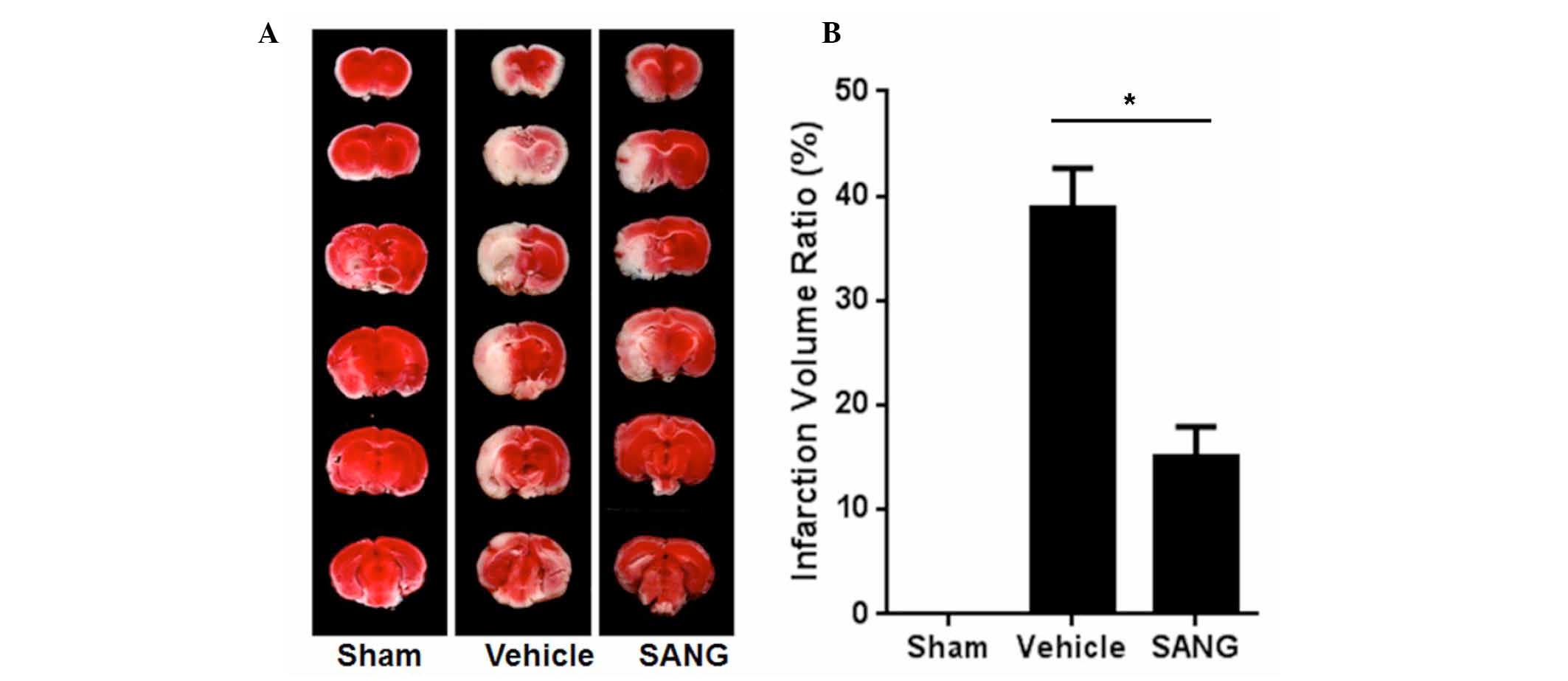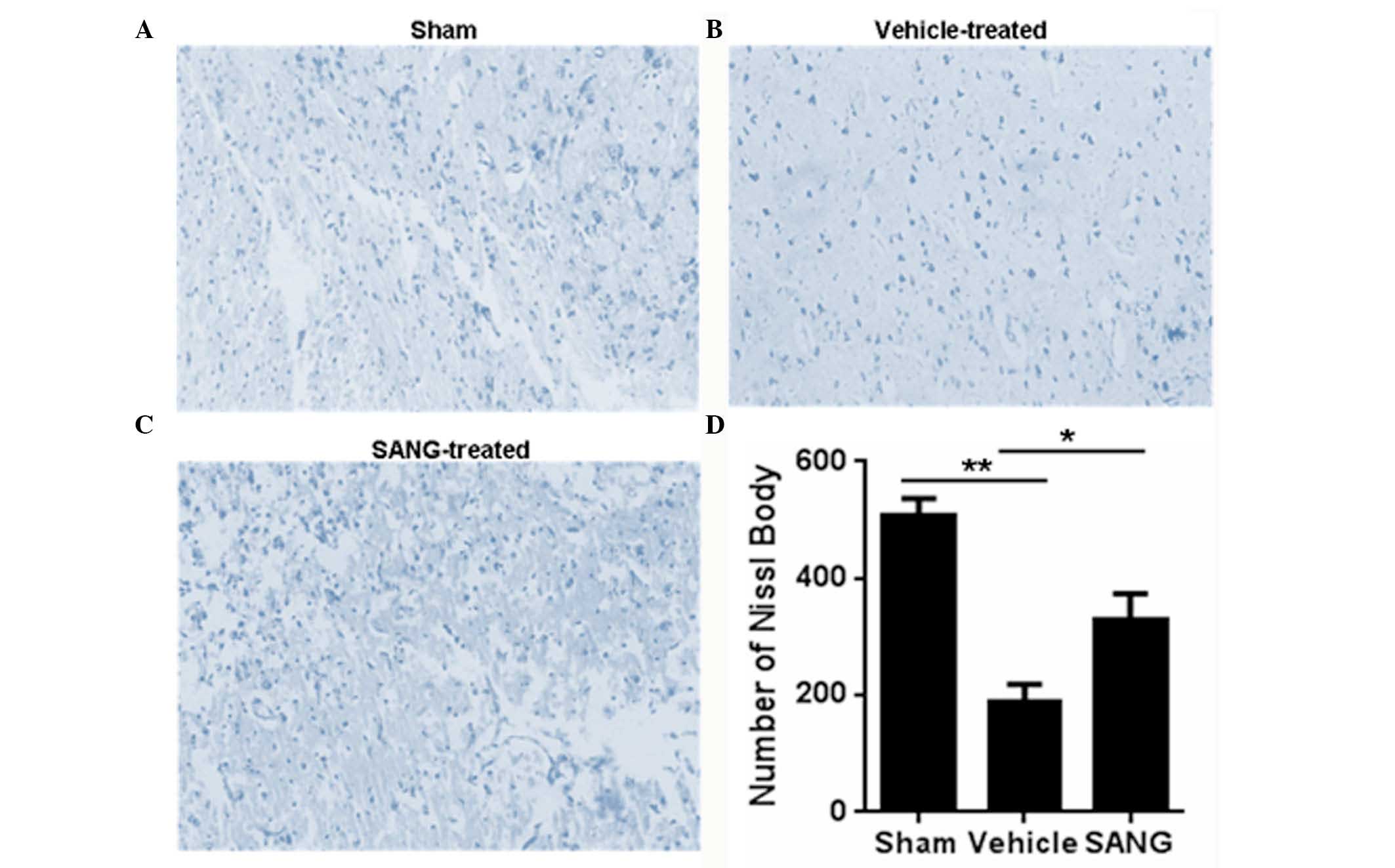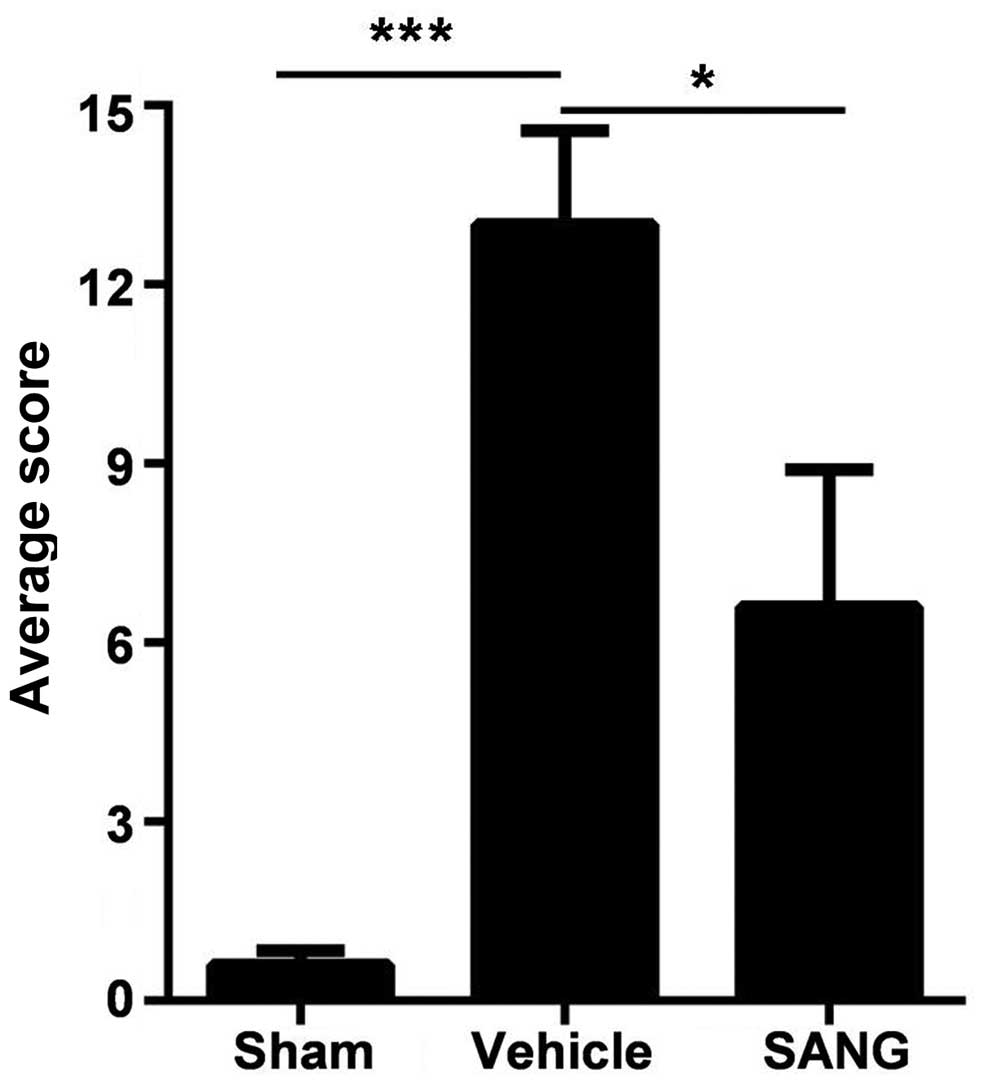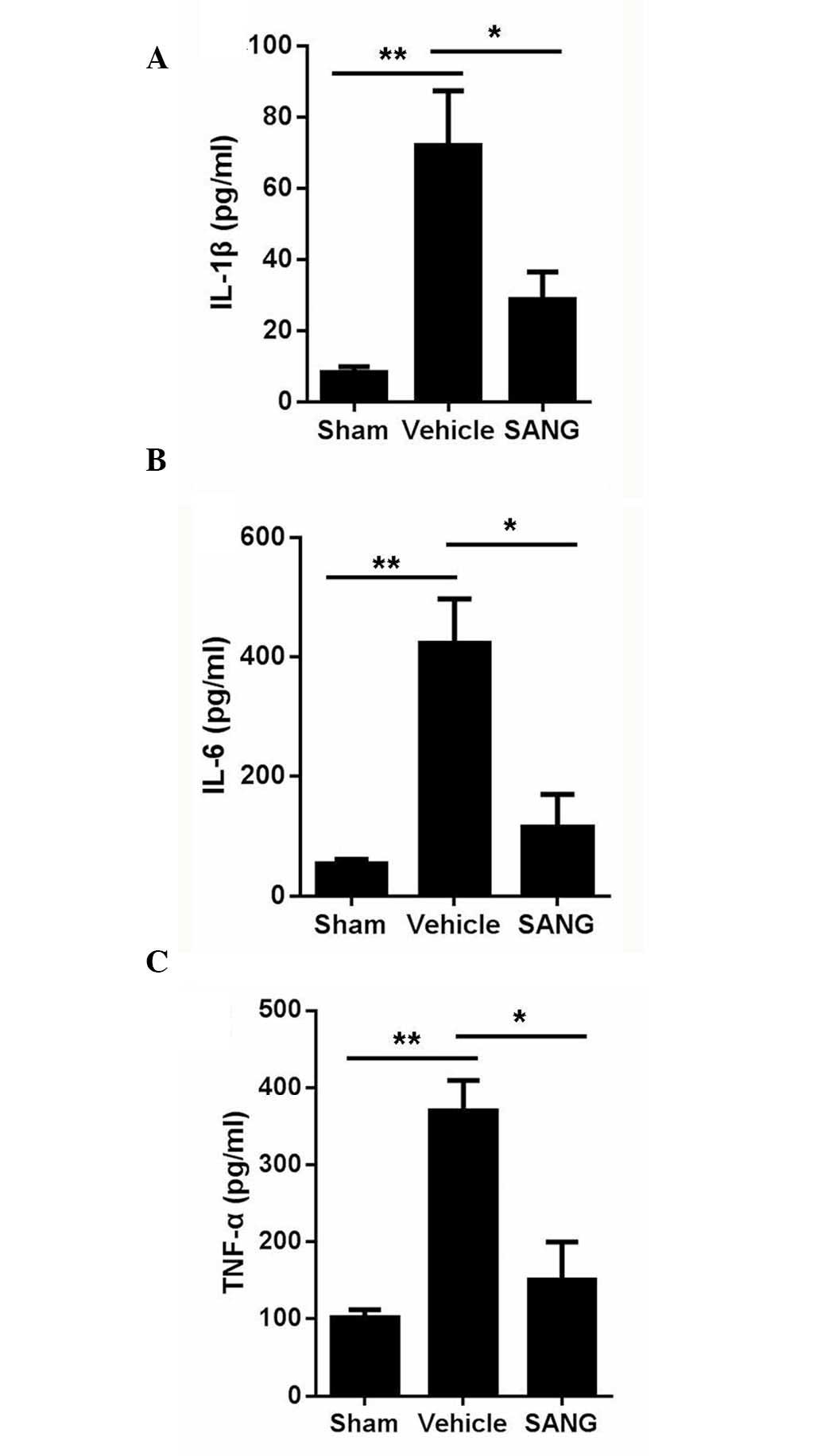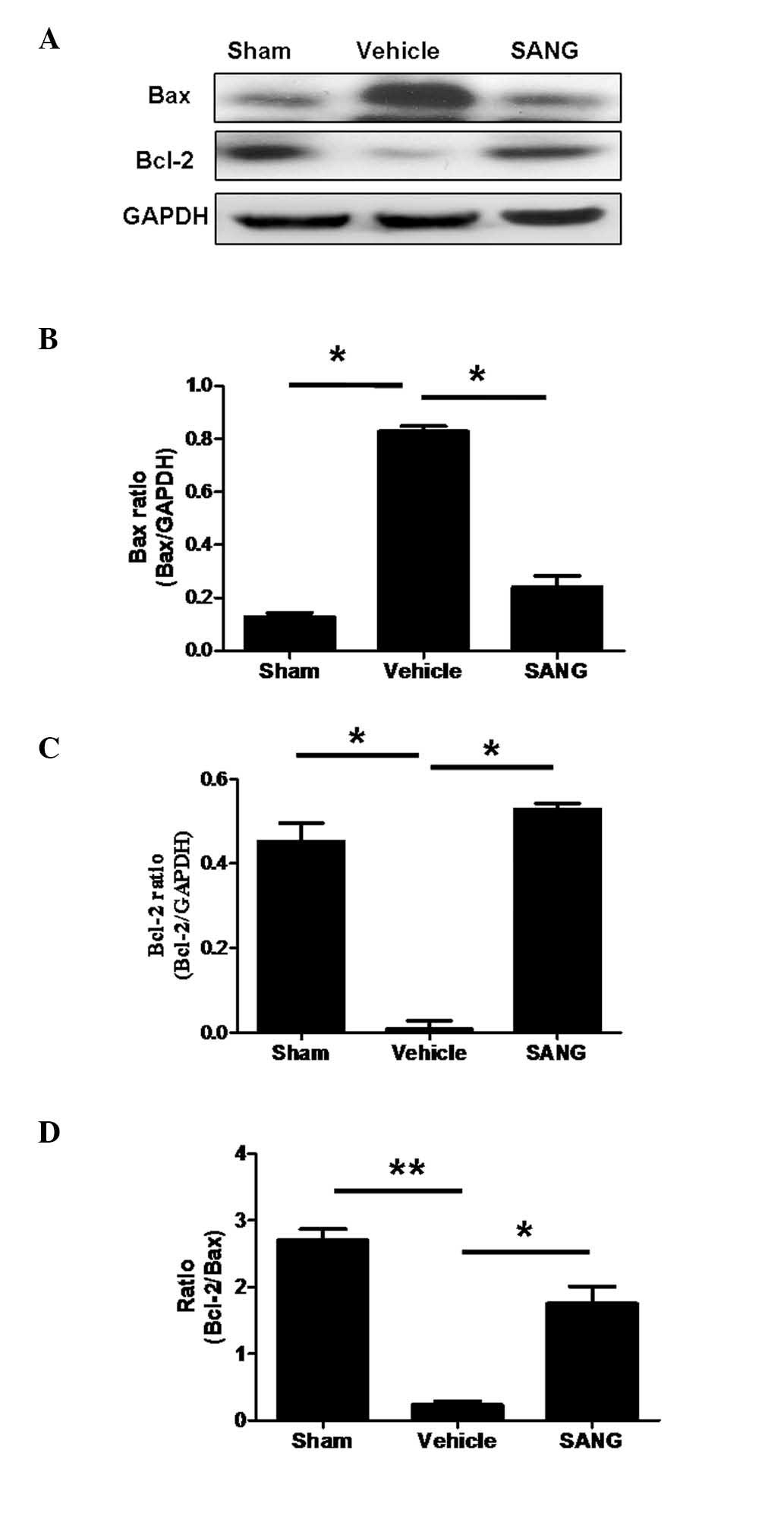|
1
|
Niu X, Fan T, Li W, Xing W and Huang H:
The anti-inflammatory effects of sanguinarine and its modulation of
inflammatory mediators from peritoneal macrophages. Eur J
Pharmacol. 689:262–269. 2012. View Article : Google Scholar : PubMed/NCBI
|
|
2
|
Li H, Zhai Z, Liu G, Tang T, Lin Z, Zheng
M, Qin A and Dai K: Sanguinarine inhibits osteoclast formation and
bone resorption via suppressing RANKL-induced activation of
NF-kappaB and ERK signaling pathways. Biochem Biophys Res Commun.
430:951–956. 2013. View Article : Google Scholar : PubMed/NCBI
|
|
3
|
Mitscher LA, Drake S, Gollapudi SR and
Okwute SK: A modern look at folkloric use of anti-infective agents.
J Nat Prod. 50:1025–1040. 1987. View Article : Google Scholar : PubMed/NCBI
|
|
4
|
Obiang-Obounou BW, Kang OH, Choi JG, Keum
JH, Kim SB, Mun SH, Shin DW, Kim KW, Park CB, Kim YG, et al: The
mechanism of action of sanguinarine against methicillin-resistant
staphylococcus aureus. J Toxicol Sci. 36:277–283. 2011. View Article : Google Scholar : PubMed/NCBI
|
|
5
|
Lee JS, Jung WK, Jeong MH, Yoon TR and Kim
HK: Sanguinarine induces apoptosis of HT-29 human colon cancer
cells via the regulation of Bax/Bcl-2 ratio and caspase-9-dependent
pathway. Int J Toxicol. 31:70–77. 2012. View Article : Google Scholar : PubMed/NCBI
|
|
6
|
Sun M, Lou W, Chun JY, Cho DS, Nadiminty
N, Evans CP, Chen J, Yue J, Zhou Q and Gao AC: Sanguinarine
suppresses prostate tumor growth and inhibits survivin expression.
Genes Cancer. 1:283–292. 2010. View Article : Google Scholar : PubMed/NCBI
|
|
7
|
Kim S, Lee TJ, Leem J, Choi KS, Park JW
and Kwon TK: Sanguinarine-induced apoptosis: Generation of ROS,
down-regulation of Bcl-2, c-FLIP and synergy with TRAIL. J Cell
Biochem. 104:895–907. 2008. View Article : Google Scholar : PubMed/NCBI
|
|
8
|
Chen Y, Zhang L, Ni J, Wang X, Cheng J, Li
Y, Zhen X, Cao T and Jia J: LLDT-8 protects against cerebral
ischemia/reperfusion injury by suppressing post-stroke
inflammation. J Pharmacol Sci. 131:131–137. 2016. View Article : Google Scholar : PubMed/NCBI
|
|
9
|
Shim R and Wong CHY: Ischemia,
Immunosuppression and Infection--Tackling the Predicaments of
Post-Stroke Complications. Int J Mol Sci. 17:642016. View Article : Google Scholar
|
|
10
|
Broughton BR, Reutens DC and Sobey CG:
Apoptotic mechanisms after cerebral ischemia. Stroke. 40:e331–e339.
2009. View Article : Google Scholar : PubMed/NCBI
|
|
11
|
Dirnagl U, Iadecola C and Moskowitz MA:
Pathobiology of ischaemic stroke: An integrated view. Trends
Neurosci. 22:391–397. 1999. View Article : Google Scholar : PubMed/NCBI
|
|
12
|
Murakami A, Nakamura Y, Tanaka T, Kawabata
K, Takahashi D, Koshimizu K and Ohigashi H: Suppression by citrus
auraptene of phorbol ester-and endotoxin-induced inflammatory
responses: Role of attenuation of leukocyte activation.
Carcinogenesis. 21:1843–1850. 2000. View Article : Google Scholar : PubMed/NCBI
|
|
13
|
Farhoudi M, Najafi-Nesheli M, Hashemilar
M, Mahmoodpoor A, Sharifipour E, Baradaran B, Taheraghdam A,
Savadi-Oskouei D, Sadeghi-Bazargani H, Sadeghi-Hokmabadi E, et al:
Effect of IMOD™ on the inflammatory process after acute ischemic
stroke: A randomized clinical trial. Daru. 21:262013. View Article : Google Scholar : PubMed/NCBI
|
|
14
|
Niizuma K, Yoshioka H, Chen H, Kim GS,
Jung JE, Katsu M, Okami N and Chan PH: Mitochondrial and apoptotic
neuronal death signaling pathways in cerebral ischemia. Biochim
Biophys Acta. 1802:92–99. 2010. View Article : Google Scholar : PubMed/NCBI
|
|
15
|
Saito A, Hayashi T, Okuno S, Ferrand-Drake
M and Chan PH: Overexpression of copper/zinc superoxide dismutase
in transgenic mice protects against neuronal cell death after
transient focal ischemia by blocking activation of the bad cell
death signaling pathway. J Neurosci. 23:1710–1718. 2003.PubMed/NCBI
|
|
16
|
Kirkland RA, Windelborn JA, Kasprzak JM
and Franklin JL: A bax-induced pro-oxidant state is critical for
cytochrome c release during programmed neuronal death. J Neurosci.
22:6480–6490. 2002.PubMed/NCBI
|
|
17
|
Fiskum G, Murphy AN and Beal MF:
Mitochondria in neurodegeneration: Acute ischemia and chronic
neurodegenerative diseases. J Cereb Blood Flow Metab. 19:351–369.
1999. View Article : Google Scholar : PubMed/NCBI
|
|
18
|
Satoh T, Kosaka K, Itoh K, Kobayashi A,
Yamamoto M, Shimojo Y, Kitajima C, Cui J, Kamins J, Okamoto S, et
al: Carnosic acid, a catechol-type electrophilic compound, protects
neurons both in vitro and in vivo through activation of the
Keap1/Nrf2 pathway via S-alkylation of targeted cysteines on Keap1.
J Neurochem. 104:1116–1131. 2008. View Article : Google Scholar : PubMed/NCBI
|
|
19
|
Wang N, Wu L, Cao Y, Wang Y and Zhang Y:
The protective activity of imperatorin in cultured neural cells
exposed to hypoxia re-oxygenation injury via anti-apoptosis.
Fitoterapia. 90:38–43. 2013. View Article : Google Scholar : PubMed/NCBI
|
|
20
|
Hwang SY, Shin JH, Hwang JS, Kim SY, Shin
JA, Oh ES, Oh S, Kim JB, Lee JK and Han IO: Glucosamine exerts a
neuroprotective effect via suppression of inflammation in rat brain
ischemia/reperfusion injury. Glia. 58:1881–1892. 2010. View Article : Google Scholar : PubMed/NCBI
|
|
21
|
Wang C, Pei A, Chen J, Yu H, Sun ML, Liu
CF and Xu X: A natural coumarin derivative esculetin offers
neuroprotection on cerebral ischemia/reperfusion injury in mice. J
Neurochem. 121:1007–1013. 2012. View Article : Google Scholar : PubMed/NCBI
|
|
22
|
Denes A, Ferenczi S and Kovács KJ:
Systemic inflammatory challenges compromise survival after
experimental stroke via augmenting brain inflammation, blood- brain
barrier damage and brain oedema independently of infarct size. J
Neuroinflammation. 8:1642011. View Article : Google Scholar : PubMed/NCBI
|
|
23
|
Kamel H and Iadecola C: Brain-immune
interactions and ischemic stroke: Clinical implications. Arch
Neurol. 69:576–581. 2012. View Article : Google Scholar : PubMed/NCBI
|
|
24
|
Brea D, Sobrino T, Ramos-Cabrer P and
Castillo J: Inflammatory and neuroimmunomodulatory changes in acute
cerebral ischemia. Cerebrovasc Dis. 27:(Suppl 1). S48–S64. 2009.
View Article : Google Scholar
|
|
25
|
Benakis C, Vaslin A, Pasquali C and Hirt
L: Neuroprotection by inhibiting the c-Jun N-terminal kinase
pathway after cerebral ischemia occurs independently of
interleukin-6 and keratinocyte-derived chemokine (KC/CXCL1)
secretion. J Neuroinflammation. 9:762012. View Article : Google Scholar : PubMed/NCBI
|
|
26
|
Hamishehkar H, Beigmohammadi MT, Abdollahi
M, Ahmadi A, Mahmoodpour A, Mirjalili MR, Abrishami R, Khoshayand
MR, Eslami K, Kanani M, et al: Identification of enhanced cytokine
generation following sepsis. Dream of magic bullet for mortality
prediction and therapeutic evaluation. Daru. 18:155–162.
2010.PubMed/NCBI
|
|
27
|
Lambertsen KL, Biber K and Finsen B:
Inflammatory cytokines in experimental and human stroke. J Cereb
Blood Flow Metab. 32:1677–1698. 2012. View Article : Google Scholar : PubMed/NCBI
|
|
28
|
Pradillo JM, Denes A, Greenhalgh AD,
Boutin H, Drake C, McColl BW, Barton E, Proctor SD, Russell JC,
Rothwell NJ and Allan SM: Delayed administration of interleukin-1
receptor antagonist reduces ischemic brain damage and inflammation
in comorbid rats. J Cereb Blood Flow Metab. 32:1810–1819. 2012.
View Article : Google Scholar : PubMed/NCBI
|
|
29
|
Xu Y, Wang JY, Song XH, Qu LD, Wei RL, He
FP, Wang K and Luo BY: RIP3 induces ischemic neuronal DNA
degradation and programmed necrosis in rat via AIF. Scientific
Reports. 6:293622016. View Article : Google Scholar : PubMed/NCBI
|















